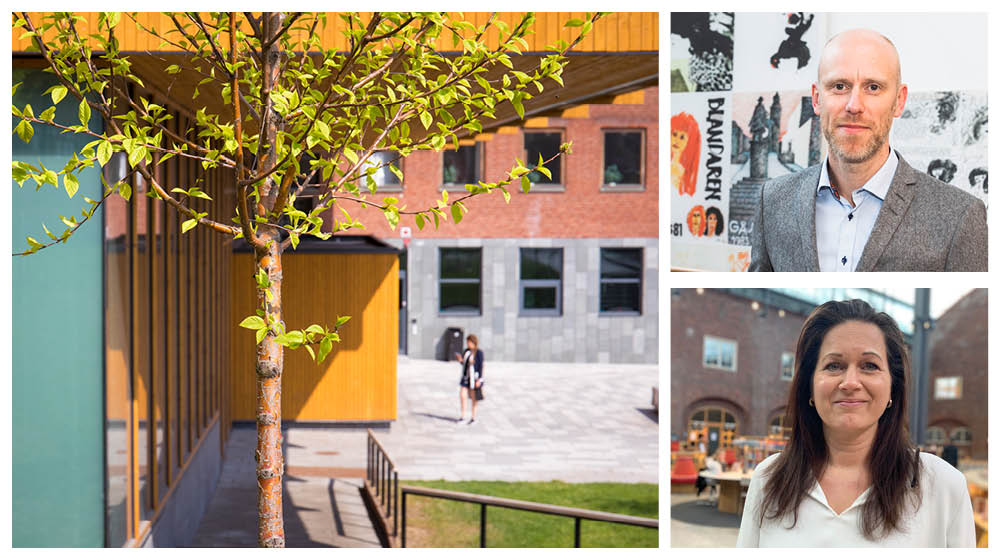At KTH Södertälje, dialogue is in focus

The move from Södertälje is affecting both KTH's students and staff, and discussions are in full swing to identify opportunities and avoid risks. We sat down with Anna Jerbrant, the relocation Project Manager, and Magnus Wiktorsson, Head of the Department of Production Engineering (IPU), to talk about risk assessments and industrial partnerships.
By autumn 2025, all employees will have left KTH Södertälje, and this autumn, students at the MSc programme in Industrial Technology and Sustainability will already have much of their teaching at KTH Campus. Anna Jerbrant , Project Manager for the Södertälje move, and Magnus Wiktorsson , Head of department at IPU, are at the centre of the relocation puzzle. In addition to them and IPU management group, there are many people involved from HR, Finance, the property department and, of course, staff, program directors and student representatives.
"The dialogue is very important," says Anna Jerbrant. "In March and April there were several hearings with the students at all programmes affected, and I was asked questions about how empty the Södertälje campus will be next semester and how the study places on the KTH Campus will be sufficient. These are examples of issues we are working hard on right now, in dialogue with the student unions (THS and Telge Teknologsektion), program directors, the property department and others”.
During the spring, all employees affected by the move had the chance to contribute to risk assessments, both those moving from Södertälje and those receiving staff in Stockholm and Flemingsberg. Magnus Wiktorsson takes his responsibility for the work environment seriously and sees a need to look carefully at office and lab space, and the availability of classrooms. The psychosocial aspect is also addressed.
“We predict that conflicts could arise around different ways of working, different cultures, new office adaptations, densification, shared labs, etcetera. To manage this, we need to create an understanding of each other's working methods and have open communication”.
“It is also likely that we will have an increased workload during the academic year 2024/2025. Some employees will work on two campuses, plan the move and carry out the move, while we at the same time need to conduct good teaching and research. To manage this, we are already establishing common working methods for workforce planning. We also need to have a close dialogue with employees about each individual's situation”.
Different staff groups are affected differently
"What about my job?" many people wonder. According to Magnus, the department’s financial situation, with projected deficits for 2024 and 2025, has led to a hiring freeze and stopped investments. In addition, changes are being made to education and course offerings, while a number of people will leave KTH due to temporary positions, at their own request and through retirements.
“We are looking at the needs of KTH and working with different groups of staff and activities separately. One group of teachers from the Technical Preparatory Year will move to Flemingsberg in July 2025. They visited in April to familiarise themselves with their new colleagues and look at the premises”, Magnus Wiktorsson says.
“Other teachers and researchers at IPU are planned into IPU's premises at KTH Campus. For this group, the situation is a little more difficult to plan because we have many uncertainties in the finances and the educational offer. Unfortunately, we do not have all the answers yet, and we encourage employees to raise questions and concerns to their closest manager, safety representative or HR.”
Industry collaborations continue
Dialogue has also been conducted with key partners such as Scania, AstraZeneca, Södertälje Municipality and Södertälje Science Park during the spring. For example, a dedicated working group will compile the needs and contributions KTH can continue to make to ensure a strong knowledge environment in Södertälje.
"Both Scania and AstraZeneca are still very important partners for KTH," says Magnus Wiktorsson. "There are parts of our education and research that have a great need for a presence in Södertälje and we want to enable that. At the KTH Campus, we also see a need for developed forms of collaboration with the industry, including Scania and AstraZeneca”.
By the autumn, there will be a detailed project plan, which will be developed into more concrete relocation plans by early spring 2025. IPU staff will be regularly informed at meetings in various forms.
"Many of us are working on planning all the different details of the move right now”, says Anna Jerbrant. “Everyone concerned will be involved in due course, but you will have to be patient until the beginning of the autumn semester."
Text: Ulrika Georgsson
